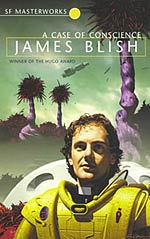
![]() DrEvilO
DrEvilO
2/11/2016
![]()
People don't write speculative fiction like this anymore, by which I mean several things. First, this is dated. Blish's world of dinosaur-like pacifists living in perfect harmony and communicating with giant trees feels like something out of the golden age of science fiction, and his view of a future earth where the cold war has driven mankind underground (and insane) feels like a 50s dystopia. This is understandable, since the book was written in the 50s, but it calls the applicability of the story for modern readers into question.
However, I think that this book is relevant, precisely because nothing quite like it is being written today. This is a morality tale with such straightforward plot and characters that modern readers (and publishers) will probably be turned off. The cynical atheist, the impotent humanist, the diffident follower and the single-minded catholic priest are not realistic characters. They are rather representative constructs of universal impulses, like what you would see in a morality play. The plot is reminiscent of "The man who fell to earth" or "The Dispossessed" and, like those books, is mostly an excuse for some philosophic musings. Unlike those books, there is tremendous ambiguity as to the meaning of the events in the book. Each character sees the same events but interprets them in wildly different ways. Because the first and last perspective given is that of the priest, there is some temptation to take his view as more correct than the others. I think that would be a callow mistake. It's true that the cynic is very unsympathetic, really downright despicable, but Blish makes it clear that his viewpoint is meant to have a degree of validity (even if mistakes are clearly made...)
In short, it's a book that's very simple to read and somewhat complex to think about. That the interpretation of the final events range from salvation to a horrifying mistake is a clear indicator that there is more going on here than the simple plot and characters which are somewhat offensive to our sophisticated modern palate. The focus on the priest is explained by the title, for it is his conscience with which the book is concerned. Considering his final actions and what he _thinks_ that he has accomplished by them makes the consideration of his conscience as complex a question as anyone could wish for.